“Let food be thy medicine, and let medicine be thy food.” – Hippocrates, 400 BC
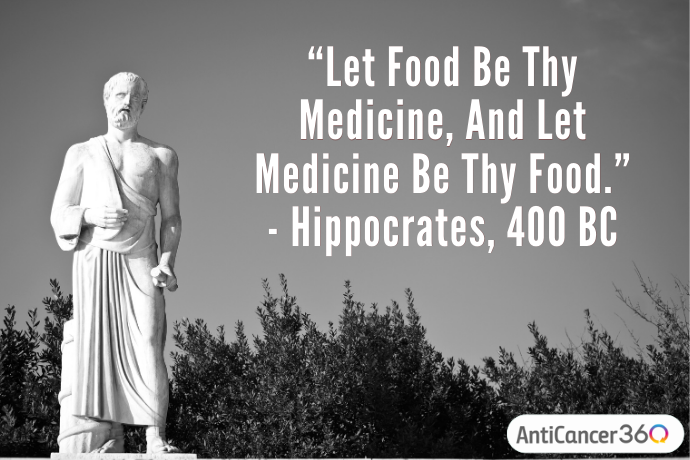
When you’re fighting cancer, it is vital to support your body in every way possible. And one of the most important ways to do this is with the food and nutrients that you eat.
Healthy diets, foods, and food extracts can all help fight cancer, in addition to your oncologist treatments. And these can be especially important for difficult and later-stage cancers.
One of these food extracts is quercetin… a naturally occurring anticancer substance that we’ll be talking about today.
Overall, there are many anticancer substances and strategies that can help you fight cancer from every direction. And as you’ll see, quercetin may be a worthwhile addition to your overall anticancer approach, depending on your unique situation.
So in today’s post we will explore the compelling research supporting quercetin’s potential anticancer benefits, and show you how you can include it in your overall treatment program.
What is Quercetin?
Quercetin is a flavonoid, which is a naturally-occurring plant pigment found in many fruits and vegetables. Flavonoids are plant nutrients that contribute to the vivid colors of fruits and vegetables. They also have many anti-inflammatory, antioxidant, and immune system benefits. Diets rich in flavonoids overall may be beneficial in preventing heart disease as well as cancer [1].
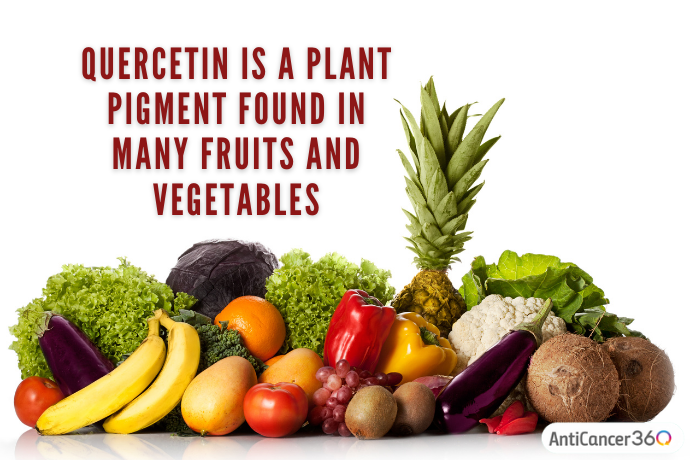
Quercetin is found mostly in the skins and leaves of various fruits and vegetables. Some quercetin-rich foods include onions, apples, berries, kale, tomatoes, broccoli, green beans, and asparagus. Quercetin is also in red wines, teas, and several herbs including Ginkgo biloba, St. John’s wort, and American elder [2].
Quercetin has numerous potential beneficial effects on the human body and has been widely investigated in thousands of laboratory studies and hundreds of human trials.
Much of the research has focused on quercetin’s potential ability to help people fight diabetes, obesity, heart disease, and cancer. And overall, quercetin has been extensively studied as an add-on therapy to conventional cancer treatment [3].
But for today’s post, we’re going to focus on the anticancer potential of quercetin. So first, we’ll start with the metabolic blocking aspects of quercetin on cancer cells.
Cancer Metabolism Suppression: How to Starve Cancer with Quercetin
One of the hallmarks of cancer cells is how they can reprogram the way they make energy from their available resources. So to keep up with their rapid growth, cancer cells demand lots of nutrients, like sugars, fats, and proteins.
Cancer metabolism is the altered process by which cancer feeds itself with these nutrients to make energy. Cancer cells have rewired their metabolic pathways compared to normal, healthy cells. So, the exploration of how to starve cancer with drugs and natural substances, like quercetin, is a key cancer-fighting strategy.
In this sense, we aim to prevent sugar, fats, and proteins from sustaining cancer cells. This “starvation strategy” weakens cancer cells, making them more vulnerable to treatment. And quercetin is one of many natural substances that show potential in blocking cancer metabolism pathways.
Quercetin May Block Glucose Related Cancer Metabolism
Tumor cells typically require high blood sugar (glucose) uptake and metabolism to satisfy their high-demand energy needs. Fortunately, we may be able to use quercetin to obstruct the flow of sugar into cancer cells.
After eating carbohydrate-containing foods, sugar is carried throughout our bodies in the blood. But quercetin may help to block the transport of sugar from the bloodstream into cells by blocking a mechanism called “GLUT1.”
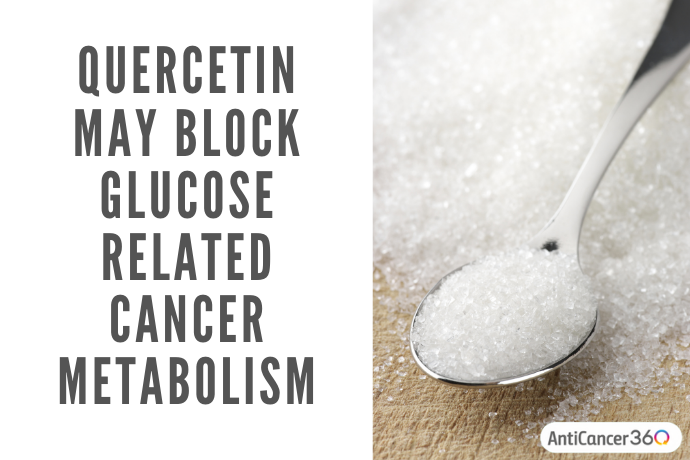
GLUT1 is a type of glucose transporter and is found in nearly every human cell. In certain forms of cancer, tumor cells can grow more GLUT1 glucose transporters on their surface than healthy cells. This overabundance of GLUT1 in cancer cells helps accelerate glucose uptake, giving the cancer cell the fuel it needs to grow and survive.
GLUT1 is a potential target of interest for the development of anticancer therapies overall. But researchers have found that quercetin exerts anticancer effects by binding with the surface of GLUT1 and slowing glucose transport into cancer cells.3 Because of this, quercetin may be useful for starving cancer cells and enhancing other anticancer therapies.
Quercetin may also disrupt a cellular process called “oxidative phosphorylation…” another energy pathway that cancers can use to survive.
Oxidative phosphorylation (OxPHOS) is the metabolic process in which nutrients are transformed into cellular energy (ATP). OxPHOS takes place in the inner membrane of the mitochondria of each cell, and ATP is the primary energy source for all cells of living organisms [4].
Quercetin has been found to actually accumulate in cancer cell mitochondria. Extensive research has also found that quercetin slows down OxPHOS, preventing mitochondrial ATP construction, helping drain cancer cells’ energy. And without energy, cell death (apoptosis) occurs [5].
Quercetin’s potential to trigger apoptosis via the mitochondrial pathway has been shown in a variety of laboratory studies. It is especially interesting to note that quercetin causes cell death in cancer cells, but not in the nearby healthy cells [5].
The bottom line: quercetin’s multiple effects may help block sugar from fueling cancer cells.
Quercetin May Interrupt Cancer Metabolism of Glutamine
Unfortunately, some cancers are relentless. And if a tumor is deprived of glucose, it can adapt to extract more energy from other resources like fat and protein.
Amino acids, the building blocks of proteins, have many valuable cell functions. And glutamine is the most abundant amino acid in our bodies. So as you can imagine, tumor cells also demand high levels of glutamine.
Fortunately, blocking glutamine metabolism in cancer cells is a trending pursuit of recent cancer research. And quercetin functions in ways that may interfere with how cancer cells metabolize glutamine.
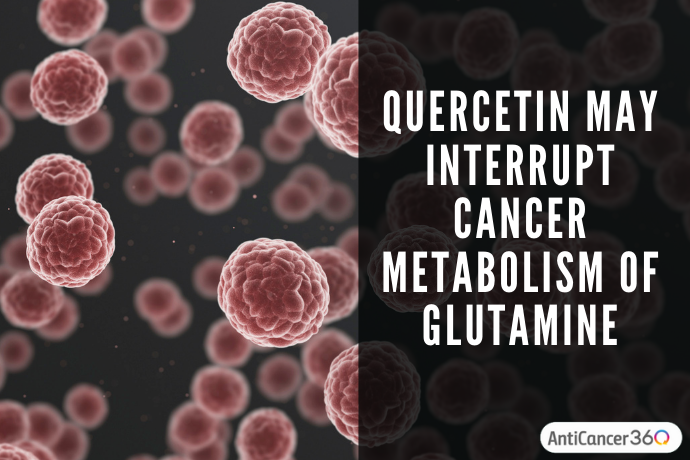
Insulin-like growth factor (IGF)-1 plays an essential role in regulating glutamine-related cell growth. Elevated blood levels of IGF-1 are associated with higher risk of several cancers, including colon, prostate, and breast cancer. Research in mice suggests that quercetin blocks IGF-1 signaling which contributes to its potent anticancer effects [6].
Quercetin may also help to target another glutamine-related pathway known as mTOR (mammalian target of rapamycin.)
mTOR is a cell enzyme that regulates growth in mammals.. mTOR also provides a vital link between the availability of nutrients and metabolism control [7]. Scientists have learned that the mTOR pathway is activated during tumor formation, and can become uncontrolled in some cancers.
Researchers have found that quercetin acts as an anticancer agent by blocking (inhibiting) mTOR signaling [8]. Quercetin’s ability to inhibit mTOR activity makes this natural substance an exciting tool for fighting cancers associated with uncontrolled mTOR regulation [9].
Next we’ll look at how quercetin disrupts cancer’s fat metabolism, in addition to sugar and protein metabolism.
Quercetin Interferes with Cancer Metabolism of Fats
Research shows that quercetin can also potentially block fat metabolism in cancer cells.
Healthy levels of fats (lipids, fatty acids, and cholesterol) are required for many essential body functions. The metabolism of fats affects many basic processes, including cell growth, proliferation, and survival. As a result, the reprogramming of fat metabolism plays a significant role in cancer progression [10].
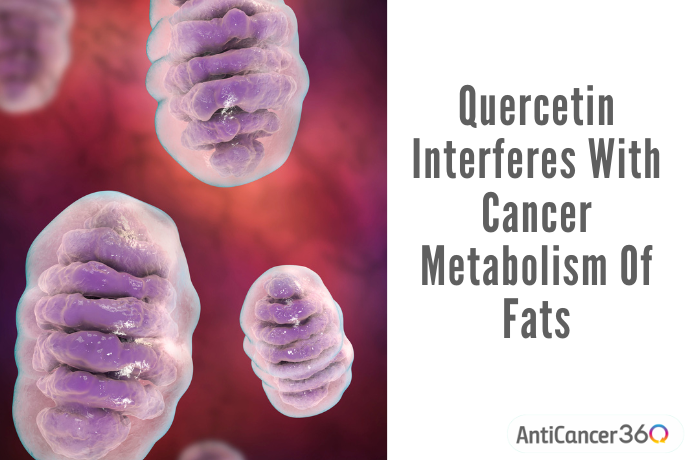
Cancer cells depend on a steady supply of lipids, which are essential for building tumor cell membranes. Since fatty acids are the building blocks of these valuable lipids, fatty acid synthase enzyme (FASN) has become a target in fighting cancer.
Scientists have observed that quercetin acts as a potent inhibitor of FASN activity in prostate and breast cancer cells [11]. A 2014 laboratory study found that quercetin could induce cell death (apoptosis) in human liver cancer cells that had an overgrowth of FASN. This apoptosis occurred along with the reduction of FASN activity in the cells. These laboratory findings suggest that quercetin may be useful in fighting liver cancer [12].
Besides the ways quercetin can interfere with cancer’s metabolism, quercetin is also known for its antioxidant effects.
Antioxidant Effects of Quercetin
Quercetin is a powerful antioxidant. Its antioxidant effects helps prevent the spread of various cancers, such as lung, prostate, liver, breast, colon, and cervical cancers [13].
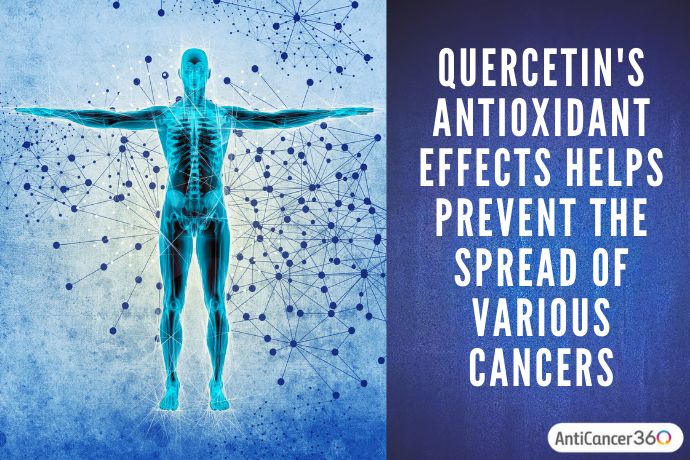
You have probably heard of antioxidants. Antioxidants are molecules that combat free radicals in your body. Free radicals are compounds that can cause damage to cells and DNA if their levels become too high. Oxidative stress occurs when antioxidants and free radicals are out of balance. Oxidative stress is linked with multiple illnesses, including diabetes, heart disease, and cancer.
The antioxidant activity of quercetin is mainly displayed through its effect on enzymes, signaling pathways, and reactive oxygen species (ROS) caused by environmental and other factors. Quercetin confers strong antioxidant activity by maintaining oxidative balance [13].
Quercetin may strengthen the body’s antioxidant capacity by regulating glutathione levels, an antioxidant made within our bodies’ cells. Glutathione plays a vital role in a complex process that converts toxic free radicals into nontoxic water molecules. In animal and cell studies, quercetin has been found to increase cell production of glutathione [13].
Quercetin can also increase cell production of other proteins that reverse free radical damage, such as p53. This protein acts as a tumor suppressor. p53 regulates cell division by preventing cells from growing and dividing too fast or in an uncontrolled way [13].
Some studies have highlighted mixed and interesting dose-dependent effects of quercetin. One study of breast cancer in mice showed an apparent response to quercetin in which a moderate dose of quercetin was most effective at inhibiting tumor growth and multiplicity. However, low dose and high dose quercetin doses were not effective, and the higher dose was associated with increased tumor growth, but not toxicity [14].
A frequent criticism of quercetin research has been that dosages studied in laboratory test tubes are much higher than what can be absorbed by humans in real life. However, a 2009 study, among other studies, showed that quercetin inhibited cancer cell proliferation at low doses [15].
Let’s look at how adding quercetin on to other oncology treatments may increase your chances of success when you’re fighting cancer.
Quercetin May Enhance the Cancer-Killing Effects of Chemotherapy
Based on extensive research, quercetin may prevent the growth of some cancers such as breast, lung, kidney, colorectal, prostate, pancreatic, and ovarian cancers. Fortunately, quercetin can be obtained from a healthy plant-rich diet or be taken as a supplement.
Quercetin, in reasonable dosages, is not harmful to healthy cells. And most importantly, it can inhibit cancer cells through several mechanisms, making it an excellent potential tool to fight cancer or to be utilized along with other anticancer treatments [16].
Some research indicates that the concentrations of quercetin obtainable in a laboratory setting are higher than what can be realistically achieved in the human body due to the limitations of absorption. But, combining quercetin with either other natural products or well-known chemotherapy drugs may be a potential strategy to overcome its limited ability to be absorbed.
Extensive experiments in laboratory cells and animals have shown that quercetin has helped to improve the antitumor effects of some chemotherapy drugs. A study in liver cancer in mice demonstrated that quercetin enhanced the antitumor effects of doxorubicin while protecting healthy liver cells [17].
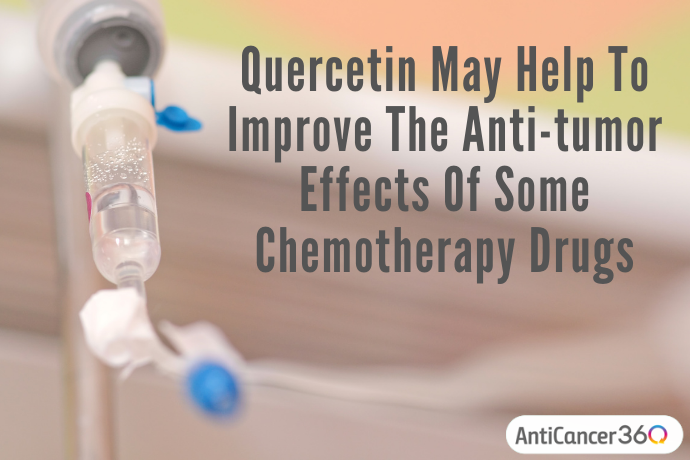
Studies have linked quercetin to enhanced antitumor effects in prostate cancer cells when combined with other flavonoids and green tea extracts.18 Other researchers have demonstrated possible synergistic benefits on prostate cancer cells when combining quercetin with chemotherapy drugs tamoxifen and 2-methoxyestradiol [18].
A vast body of scientific research supports the potentially powerful anticancer benefits of quercetin. Depending on your situation, quercetin may be a valuable addition to your overall plan.
How To Use Quercetin: Dosages, Side Effects, and Precautions
Dosage
Quercetin is available as a dietary supplement in capsule and powder form, and or can be administered directly into the veins (intravenously).
Quercetin supplements are usually taken as 500 mg tablets or capsules, two times daily [2].
In comparison, the average daily intake of quercetin from foods is 5 mg to 40 mg per day. With an abundance of whole fruits and vegetables, diet intake of 200 mg to 500 mg is possible, especially when consuming peels/skin [2].
Side Effects
Quercetin is generally well-tolerated when taken as an oral capsule or tablet. The most common side effects reported are mild and include headache and tingling of extremities [2].
In human clinical trials, no significant adverse effects were reported after oral administration of quercetin at doses up to 1000 mg per day for up to 12 weeks [19].
In clinical trials of intravenous quercetin (administered directly into veins), more side effects were reported. Side effects of intravenous quercetin include flushing, sweating, nausea, vomiting, shortness of breath, and pain at the injection site [2].
At very high doses, quercetin may potentially cause kidney damage [2].
Interactions with Drugs and Supplements
Dietary quercetin from fruits and vegetables has no known interactions with other drugs or herbal supplements. However, there are reports from animal data that quercetin supplements can interact with certain prescription drugs:
- Cyclosporine. Reduced effectiveness of cyclosporine by quercetin may require dose adjustments.
- Digoxin. Quercetin may increase digoxin levels and increase the risk of digoxin toxicity (nausea, vomiting, heart rhythm problems).
- Fluoroquinolones (ciprofloxacin, levofloxacin). Reduced effectiveness of these antibiotics has been observed in laboratory studies, but effects have not been confirmed in humans.
Overall, there could be many unknown potential drug interactions that can happen with quercetin, especially with chemotherapy and other cancer treatments. This is not a comprehensive list of possible interactions.
You must consult with your doctor or pharmacist before including any supplements in your program.
Quercetin as Part of an Aggressive, Integrative Anticancer Approach
Every cancer treatment has possible risks to consider. However, the many potential benefits of quercetin, a safe natural supplement, may outweigh the risks. Because of the risks for drug interactions with some oncologist treatments, you must talk with your doctor or pharmacist before adding quercetin to your overall anticancer program.
And ultimately, when using the “Aggressive Integrative Approach” to cancer, the goal is to fight cancer from every possible angle. This approach includes integrating natural supplements into your routine to help fight cancer.
The anticancer potential may be based on scientific data that is limited in humans, but this approach can be done in a safe way that won’t interfere with your oncology treatments.
Depending on your unique situation, why not fight cancer from every possible angle?
How are you taking control? What role are you taking in your fight against cancer? What natural or dietary supplements have you tried and what changes have you noticed since you started them? What questions or concerns do you have about quercetin? We would love to hear from you. Please leave questions or comments below!
Please talk with your healthcare professional and consider the risk-versus-benefit potential before starting quercetin or any natural supplement.
Are You A Candidate For Our Program?
If you’d like to learn more about the AntiCancer360 approach and see if we can help you… please watch our free online webinar to learn more about our approach. Then at the end, you’ll be able to schedule a free call with someone from our team so that we can discuss your case in more detail.
Citations
Dr. Patricia Weiser is one of AntiCancer360’s consultant pharmacists, science advisors, and medical writers. Her expertise helps us create safe herbal and supplement combinations and avoid potential drug interactions.
Patricia is a graduate of the University of Pittsburgh and a licensed pharmacist. She has clinical experience in both community and hospital pharmacy. She is passionate about integrative and preventative care and strives to empower her patients to take an active role in their health.

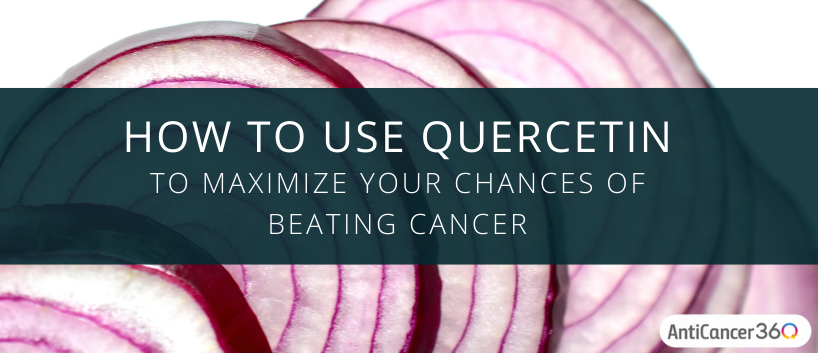



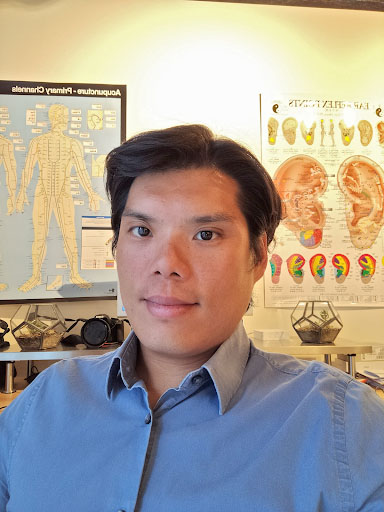
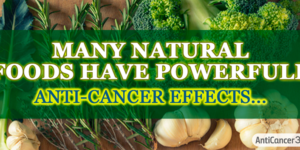
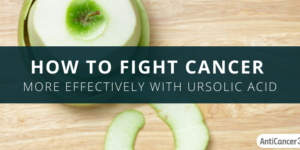
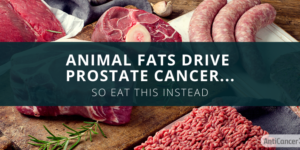
I am interested to know your opinion on the following:
Dr Sam Bailey posted a YouTube clip explaining that Quercetin uptake by the body/digestive system is very hit and miss and potentially only a small percentage of Quercetin is absorbed. Dr Sam BAiley does not recommend using Quercetin for this reason. Is this a fact? I take Quercetain (Bioceuticals), Zinc, Vit C, Vit D 2000IU’s, Magnesium and Krill Oil each morning. Along with this I grow my own greens such as Rocket, Chives and Parsley which I consume daily. I have been using these supplements and foods for most of the COVID era in the belief that my immune system is being strengthened. I am now 63 years of age.
Hi David. So, we agree that quercetin is not well absorbed. This is why we use the phytosome version which helps against this type of issue. Because overall, quercetin can be very beneficial in many ways.